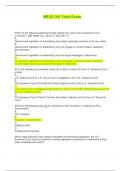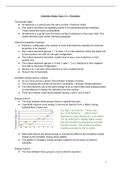Exam (elaborations)
MEJO 341 Final Exam | Questions and Answers (Complete Solutions)
- Course
- Institution
MEJO 341 Final Exam | Questions and Answers (Complete Solutions) Which of the following statements best reflects the ruling of the Supreme Court in Sorrell v. IMS Health Inc., 564 U.S. 552 (2011)? A. Government regulation of advertising may target messages contrary to its own views. B. Governmen...
[Show more]





